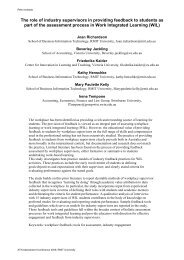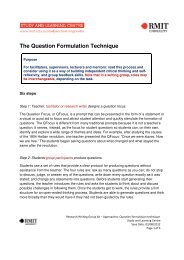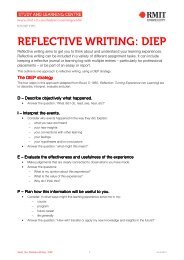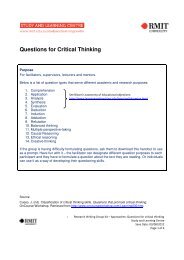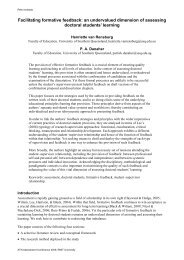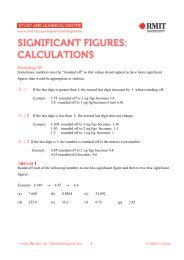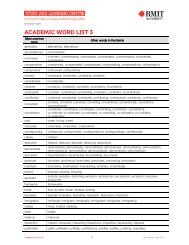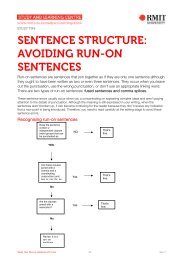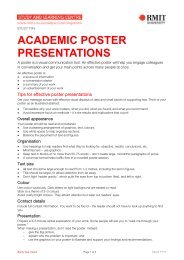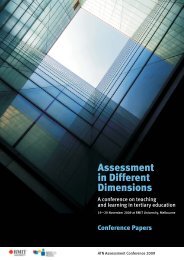student feedback and leadership - Office for Learning and Teaching
student feedback and leadership - Office for Learning and Teaching
student feedback and leadership - Office for Learning and Teaching
You also want an ePaper? Increase the reach of your titles
YUMPU automatically turns print PDFs into web optimized ePapers that Google loves.
Student Feedback & Leadership<br />
3.3.4 Observe<br />
While there was evidence of ARTs sharing experiences <strong>and</strong> outcomes within<br />
their School, the challenge of disseminating knowledge across disciplines,<br />
especially given the structural separation that characterises disciplinary<br />
separation within universities, was demonstrated in this cycle. The relatively<br />
low attendance of Heads of School not directly involved in this project at the<br />
Plenary demonstrated the difficulty of transferring experiences between<br />
Schools, particularly across disciplines. This has been termed the challenge<br />
of the ‘not-invented-here’ problems in explaining the gap between knowing<br />
what needs to be done <strong>and</strong> actually doing it (Pfeiffer & Sutton).<br />
This suggested the need <strong>for</strong> a further extension of the multi-level, multifunction<br />
<strong>leadership</strong> to leaders of learning <strong>and</strong> teaching in the Colleges <strong>and</strong><br />
School across the University. To action this the Project Manager commenced<br />
giving regular reports to the <strong>Learning</strong> <strong>and</strong> <strong>Teaching</strong> Leaders group made<br />
up of the Deans of Academic Development from each of the three Colleges,<br />
the Academic Registrar <strong>and</strong> the Heads of RMIT TAFE Schools. She also<br />
reported on developments in the project to the Community of Scholars<br />
that had been established as a regular <strong>for</strong>um <strong>for</strong> academics who had been<br />
recognised internally <strong>and</strong> externally <strong>for</strong> their excellence in learning <strong>and</strong><br />
teaching. The <strong>Teaching</strong> Fellow who was project managing another ALTC<br />
funded project into the development of <strong>Teaching</strong> Quality Indicators (TQI)<br />
was also invited to Plenary sessions.<br />
3.3.5 Reflect<br />
Reflection on the Leadership issues that emerged in Cycle 2 suggests<br />
a third element in a <strong>leadership</strong> framework <strong>for</strong> <strong>student</strong> <strong>feedback</strong>, ENGAGED<br />
LEADERSHIP. This is illustrated in Figure 11 as encompassing <strong>for</strong>mal <strong>and</strong><br />
in<strong>for</strong>mal leaders (recognised <strong>for</strong> their excellence in teaching <strong>and</strong> learning)<br />
being provided with systematised opportunities to network in order to explore<br />
the potential <strong>for</strong> innovations <strong>and</strong> lessons learnt in one discipline to be adapted<br />
to different disciplines.<br />
Figure 11 Distributed Leadership Model Element Three: Engaged Leadership<br />
Page 50



